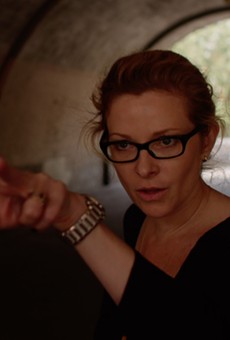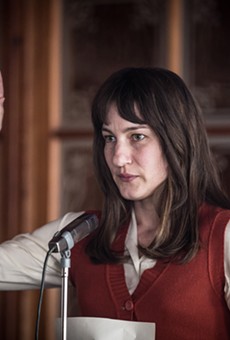
- PHOTO BY CHARLENE MUSIC
- Director Signe Taylor, center, with some of the subjects ofher film, "It's Criminal."
CITY continues its coverage of the 2017 High Falls Film Festival with a conversation with filmmaker Signe Taylor, director of the moving documentary "It's Criminal." The film focuses on a program that brings together Dartmouth college students and a group of incarcerated women to create an original play inspired by the experiences of the imprisoned women.
Taylor talked by phone about the challenges of filming with college students and inmates, and why she believes the film industry might finally be ready for some change. An edited transcript is below.
"It's Criminal" screens Saturday, November 5, at The Little (Theater 5). 5 p.m. $8-$10. A Q&A with Taylor will follow the film.
CITY: Let's start with a little bit of background. How did this film first come about?
Signe Taylor: Pati [Hernandez] and Ivy [Schweitzer], the two professors in the film, have been teaching their course since 2006, and they hired me initially for a freelance gig to just document the final performance of the class. And that was a very moving experience for me — I'd never been inside a prison. And at the end of the performance they have the prisoners and students give testimonials about how the experience has impacted them. And the first person I filmed at that particular performance was a filmmaker. And I'd just assumed that she was a Dartmouth student, but it turned out that she was a prisoner. For me that was a pretty emotional experience.
Then I continued to film the final performances for many years until I was finally like, "Look we've got to make a film about this because I want to know what's happening before they get to the stage." Because these final performances are quite emotional and moving for everybody involved.
You clearly spent a lot of time talking with the incarcerated women and getting them to open up about their lives. How did you make sure you earned that kind of trust that would allow them to talk openly on camera?
In all honesty, the women wanted to share their stories. I think that incarcerated women are among the most silenced groups in our country. Maybe after "Orange Is The New Black," people do think of women more than they might have before that show, but even if you say "prisoner" now, most people aren't going to see a woman in their head. And the women, I think, were just so happy that someone wanted to hear their story and not just write them off as bad people. They really wanted to share.
What about the Dartmouth students? Were they willing to open up, or did that take some work, too?
That was more of an issue, because the reality is the Dartmouth students have more to lose by participating in the film, right? They're in the position of privilege and that's not always necessarily a comfortable place to be in. They're exposing themselves and making themselves vulnerable in a class, and that's not often what you do. And to top it all off there's the camera there documenting it. [Laughs] I really appreciate that they were willing to open up; that they were willing to speak with me.
Related Preview: High Falls Film Festival 2017

What surprised you most in observing the interactions between the two groups?
I think what really surprised me was that I was prepared for this deep, emotional difficult experience, where you're going in and you're taking on some of the most profoundly troubling issues of our time. But what really surprised me was how much fun it was. There was a lot of laughter in that jail. Certainly not every day was a happy day. The emotions were very extreme: Some days were very happy and some were very sad. But I think what really surprised me was that the incarcerated women found a lot of joy in their experiences together. I think there's a little bit of that in the film, but sometimes I worry that I don't have enough of that in there.
Being a woman in the film industry, how do you think that affected your career? If it has.
It certainly has, and it's really come up for me a lot with all the Harvey Weinstein revelations going on.
I was going to ask about that.
OK, so I'm just going to go right there. I started off in my 20's doing documentary film. But I also explored doing fiction film, because I love film and I've always loved film. I worked in documentary film and then I started working as a production assistant in New York on ad sets and feature film sets. There was more money there and it was pretty exciting.
But I — and I blocked this for many, many years, but it's really come up for me recently — but on those sets, the producers and directors would feel like they could touch. They just had this way that they would touch your butt as you're walking by. I had directors who used to stand behind me, feeling my butt on a darkened film set while things are being filmed — when I could do nothing and move nowhere, because it's dark and it's crowded, and thousands of dollars are being spent at that moment. I would step away, and I would say, "No," but after about six months, I was like, "Forget about this. This is disgusting."
I left and I then went fully into documentary film and I never really looked back. And I'm really, really happy that documentary film is very female friendly. It's just a fantastic fit with me. But I do think that a lot of young women in the 80's and 90's, when I was working, probably walked away because those sets were so testosterone-driven. When I was a [production assistant], basically your job is to carry heavy stuff. I'm pretty strong, but I just remember people being like, "Oh you can't carry that." And I'd be like, "Well, if I can't carry it, what am I doing here?"
So I did PA work for like six to eight months and I would meet a lot of directors and producers, and I remember one time with this director, I'd met the wife and his children earlier that day on the set. And afterwards he was asking me if I wanted to go out for drinks and I was like, "No, why would I do that? I just met your wife." And I was pretty shocked. It was early on, and I remember another PA happened to overhear that conversation, and he turned to me and said, "It's so easy for women" — implying that I should just go out for drinks with this guy and my career would be set. And I was so mad at him. Just this level of ignorance around women and this atmosphere that was so prevalent. And this was like a nice guy, you know? And I remember ranting and raving, and he was like, "I'm sorry! I'm sorry!" But you know, there was just a lack of awareness back then about this.
I'm really happy I'm in documentary film and I'm really glad this stuff is coming out, because I have a daughter who's heading to college, and I think maybe she'll go into film and have a really different experience. And I feel like a lot of women have been silenced because that experience was so uncomfortable that they either left the industry or went to another aspect of the industry like I did.
Related Cady McClain wants women to see themselves in film

Obviously you've been following the Harvey Weinstein story. Are you feeling hopeful that the discussions happening now might end up having an impact?
I think that we are in a really interesting, interesting time around these issues. I remember a couple of years ago I heard the words "rape culture" for the first time, and all of a sudden in hearing those words, a lot of stuff came together for me. I went to a women's college and I have always been very feminist, and was really upset by date rape when it was going on, on the Barnard and Columbia campuses in the 80's and 90's. And it wasn't being addressed by the university. But you think of it as, "Oh, that pig," or "Oh, that gross guy," or "I'm so sorry that happened to my friend." But you don't think that it's part of an entire culture; that it's not just one guy. It's all of us participating in a culture that enables that one guy to do what he does.
And so I think that the recognition that it's not just one person doing a bad thing is key. And now everybody is starting to speak up. But now I think the conversation is getting wider, so it's not like this individual person does that thing. It's like our society has said it's OK for people to do those bad things. And once that recognition starts happening, change can occur; real change.
It would never have occurred to me to complain to anybody about the behavior that was going on on that set. Who would I possibly have gone to? It was the director and the producer. Whom I was supposed to say, "This is gross; this guy's touching me. He shouldn't be." There was no one to talk to, but now I feel like there would hopefully be an awareness that that behavior is not OK. That's a huge, monumental shift. It means we can change this.

